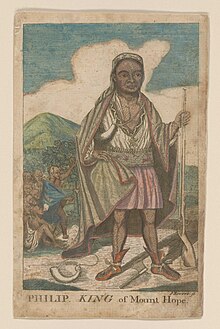
Back الملك فيليب Arabic Metakomet AZ Метакомет BE Metacomet Catalan Metacomet German Metacomet Spanish Metacomet Finnish Metacomet French Metacomet Italian メタコメット Japanese
Metacomet | |
|---|---|
 | |
| Wampanoag Sachem | |
| Preceded by | Wamsutta |
| Succeeded by | Annawan |
| Personal details | |
| Born | 1638 |
| Died | August 12, 1676 (aged 37–38) Bristol, Rhode Island |
| Cause of death | Gunshot wound |
Metacomet (1638 – August 12, 1676), also known as Pometacom,[1]: 205 Metacom, and by his adopted English name King Philip,[2] was sachem (elected chief) to the Wampanoag people and the second son of the sachem Massasoit. His older brother Wamsutta (or King Alexander) briefly became sachem after their father's death in 1661. However, Wamsutta also died shortly thereafter and Metacom became sachem in 1662.
His brother's widow Weetamoo, female sachem of the Pocasset, became Metacom's ally and friend for the rest of his life. It is unclear how many children they had or what happened to them. Wootonekanuske and one of their sons were sold into slavery in the West Indies following the defeat of the Native Americans in what became known as King Philip's War.[3]
Initially, Metacom sought to live in harmony with the colonists. As a sachem, he took the lead in much of his tribes' trade with the colonies. He adopted the European name of Philip.[4]
The colonies continued to expand. To the west, the Iroquois Confederation also was fighting against neighboring tribes in the Beaver Wars, pushing them from the west and encroaching on Metacom's territory. Finally, in 1671, the colonial leaders of the Plymouth Colony forced major concessions from him. Metacom surrendered much of his tribe's armament and ammunition, and agreed that they were subject to English law. The encroachment continued until hostilities broke out in 1675.
- ^ Silverman, David (2019). This Land Is Their Land. New York: Bloomsbury Publishing.
- ^ Lepore, Jill. The Name of War: King Philip's War and the Origins of American Identity, New York: Alfred A. Knopf, 1998. Note: King Philip "was also known as Metacom, or Metacomet. King Philip may well have been a name that he adopted, as it was common for Natives to take other names. King Philip had on several occasions signed as such and has been referred to by other natives by that name."
- ^ Lepore, J. (2019). "Chapter 2: Rulers and the Ruled". In These truths: A History of the United States. New York: W.W. Norton & Company.
- ^ Chisholm, Hugh, ed. (1911). . Encyclopædia Britannica. Vol. 21 (11th ed.). Cambridge University Press. p. 389.